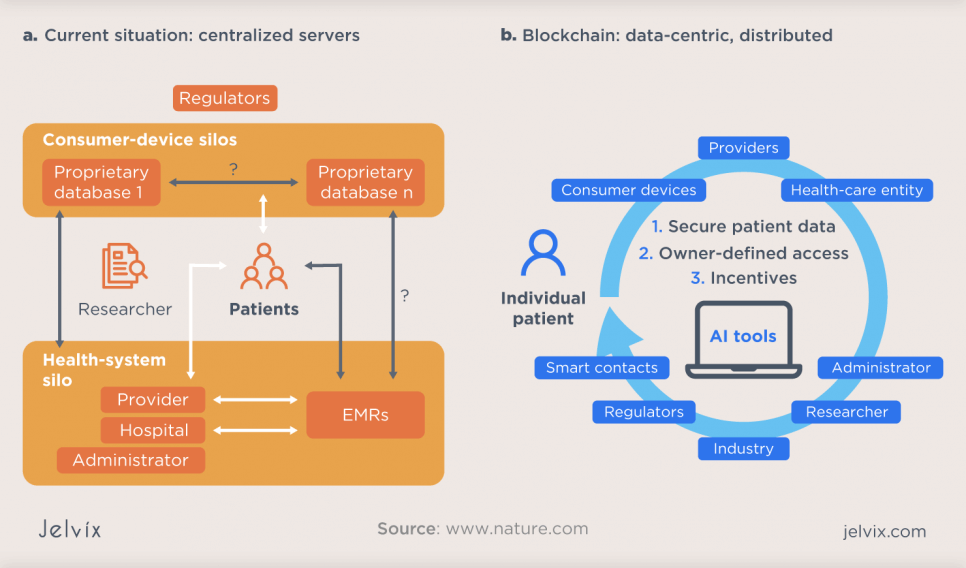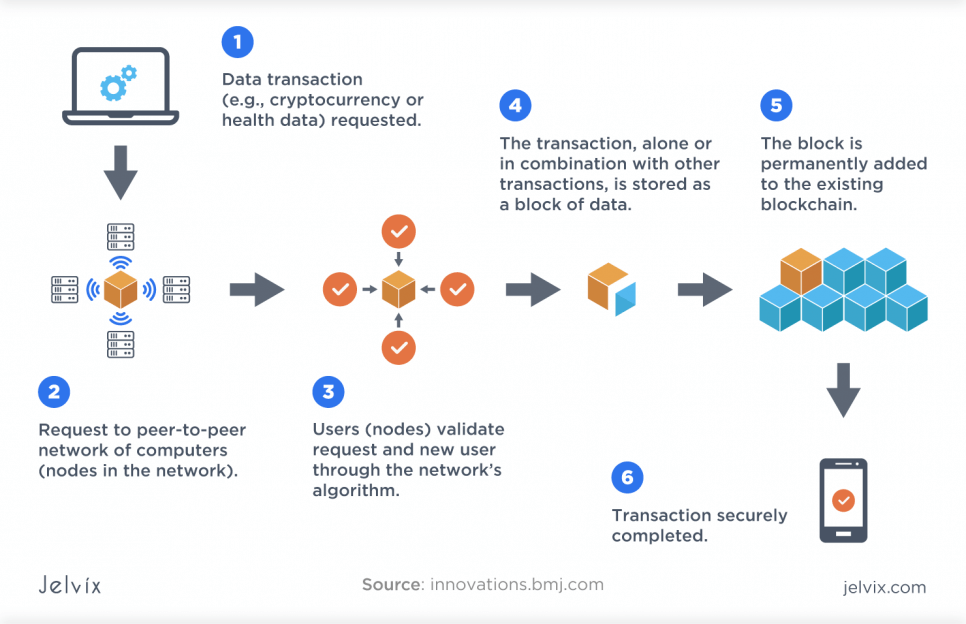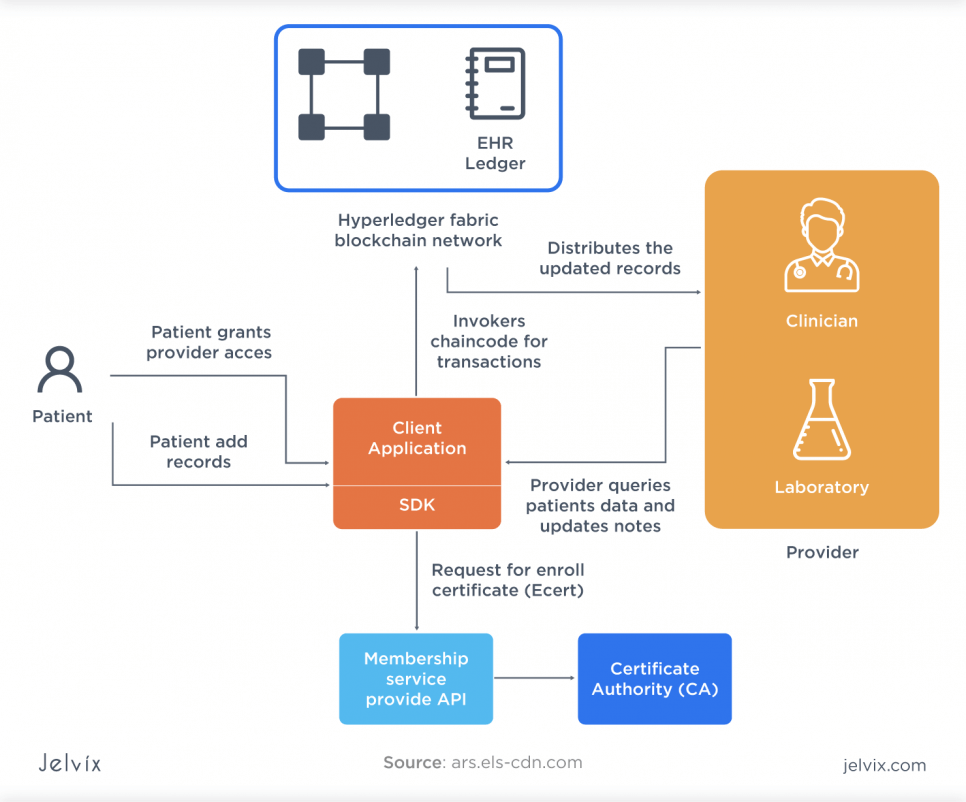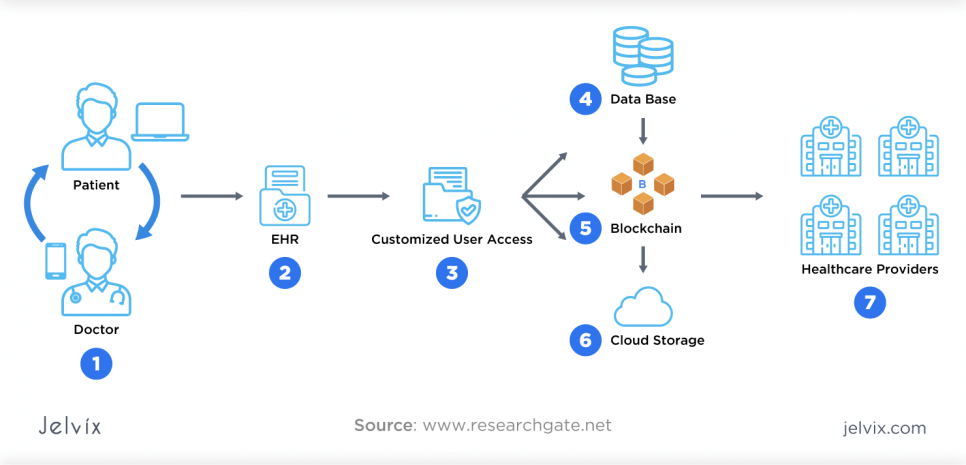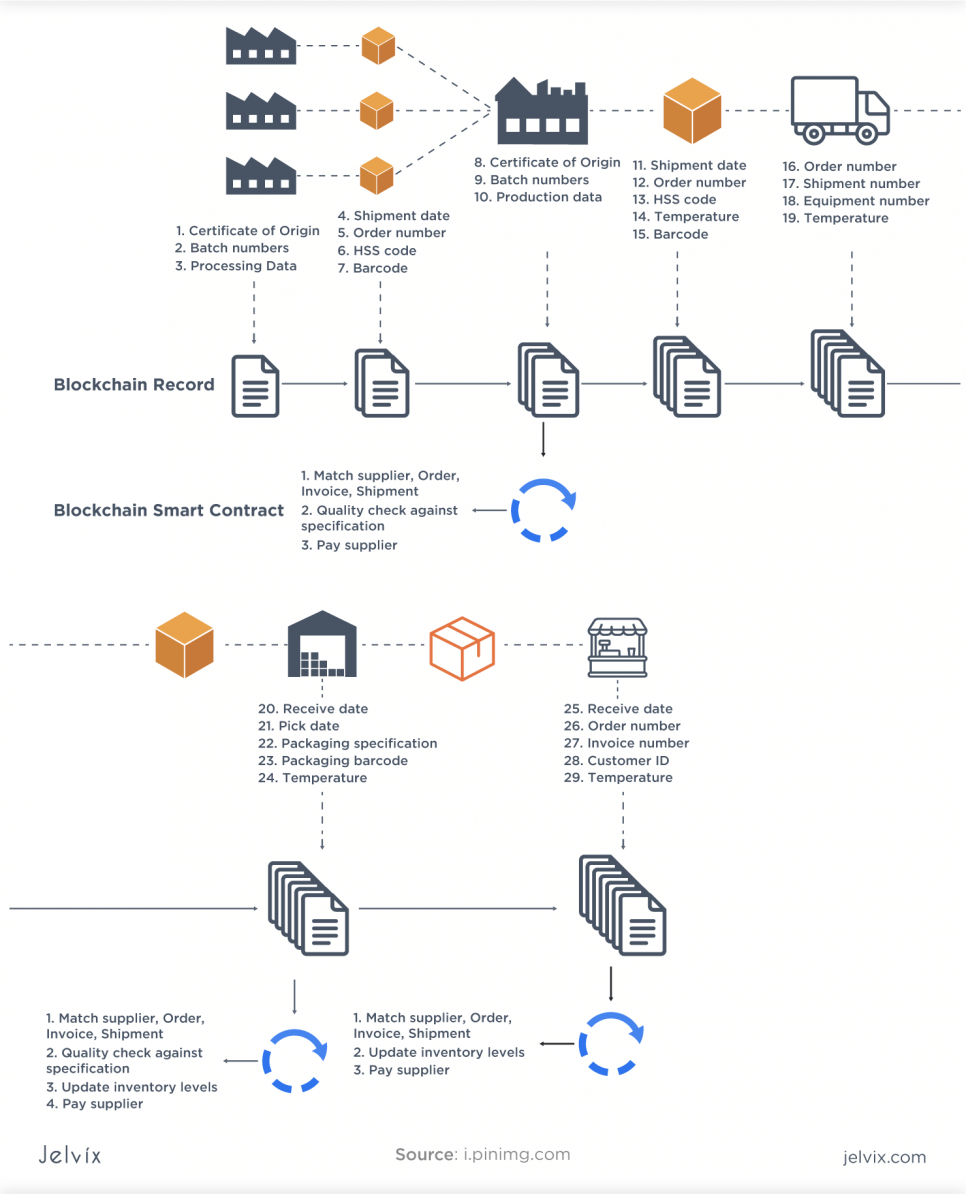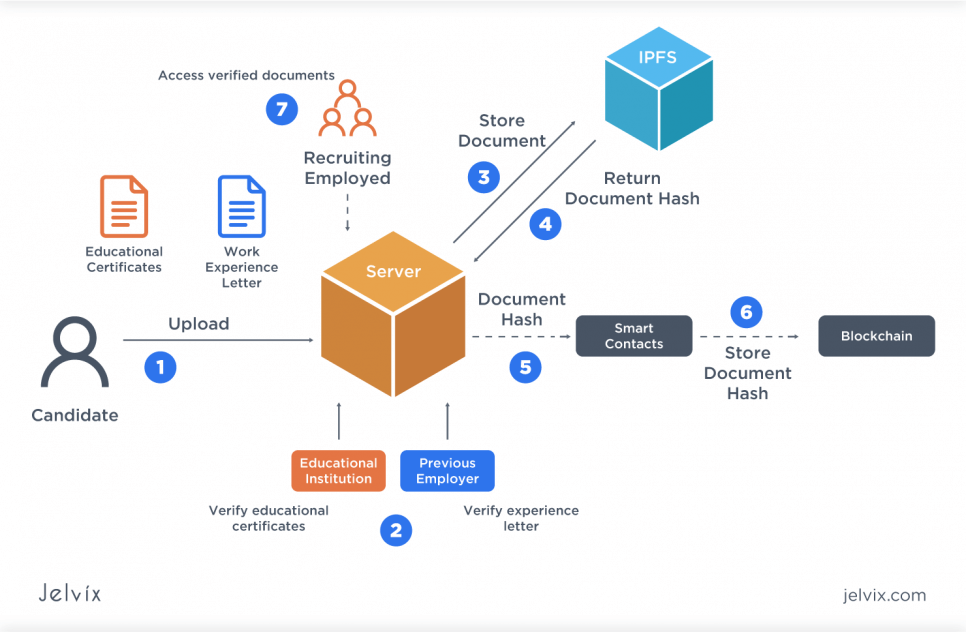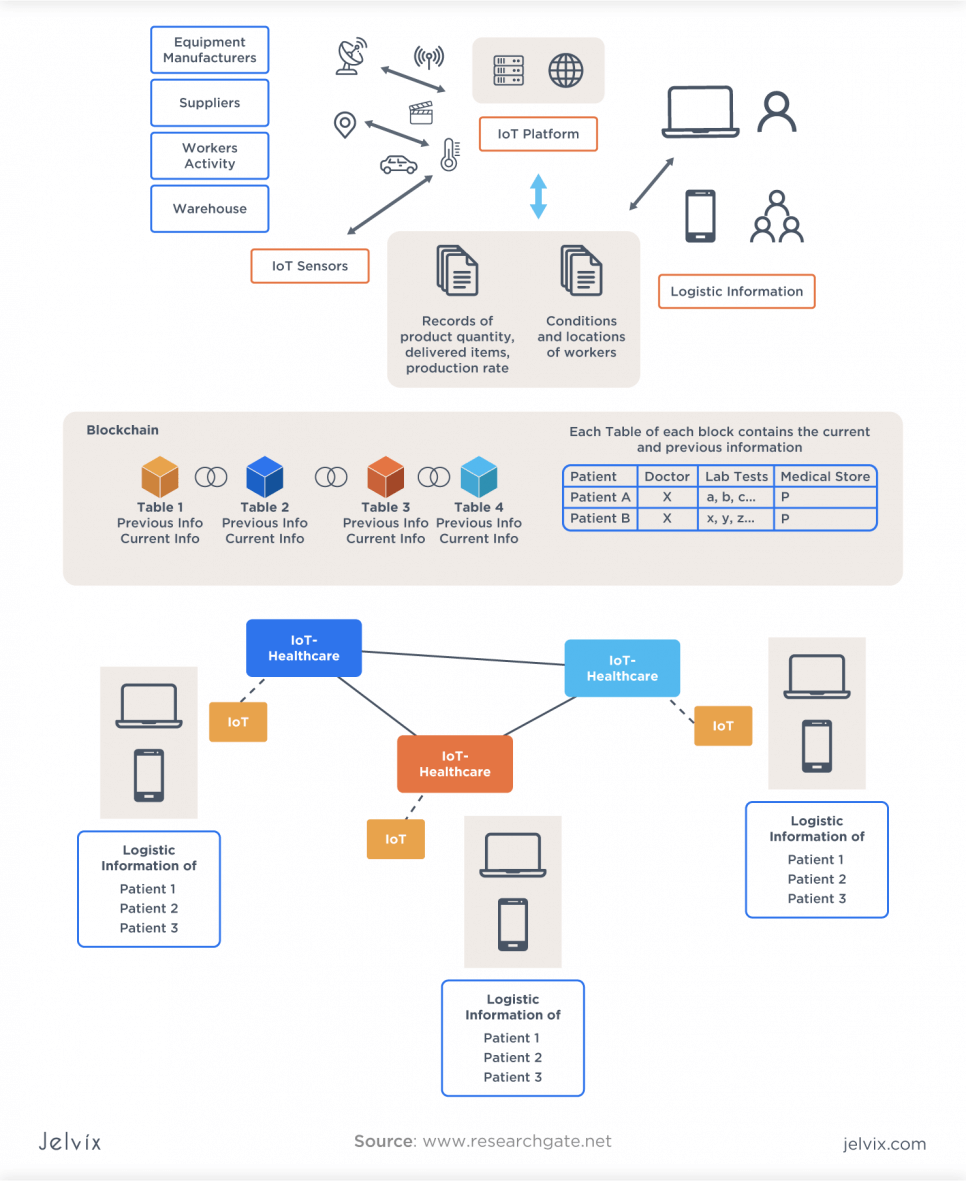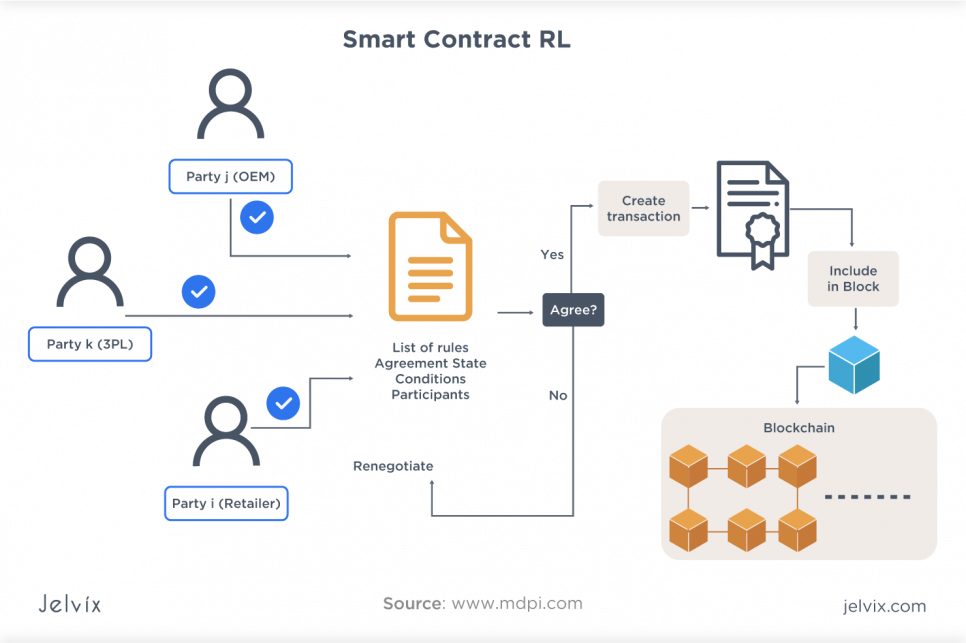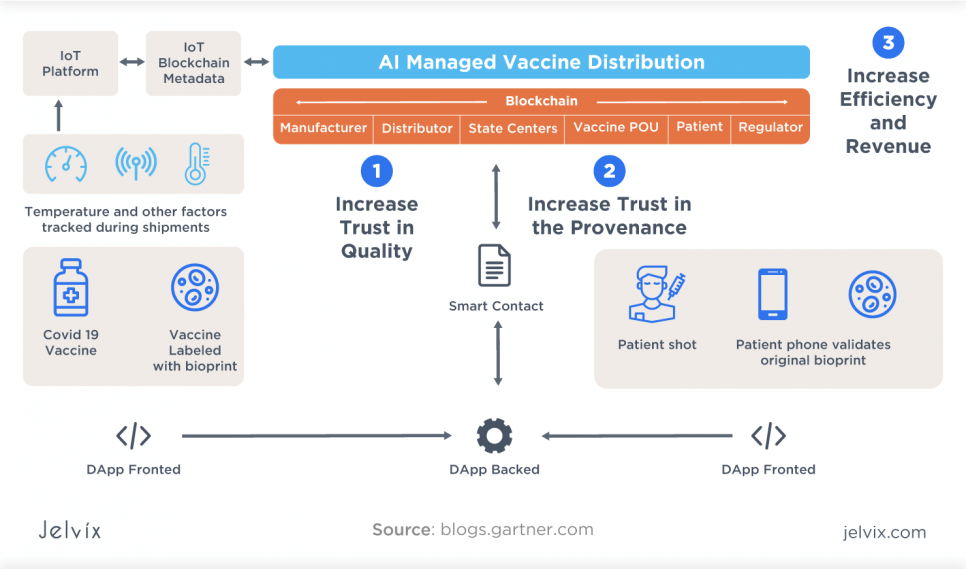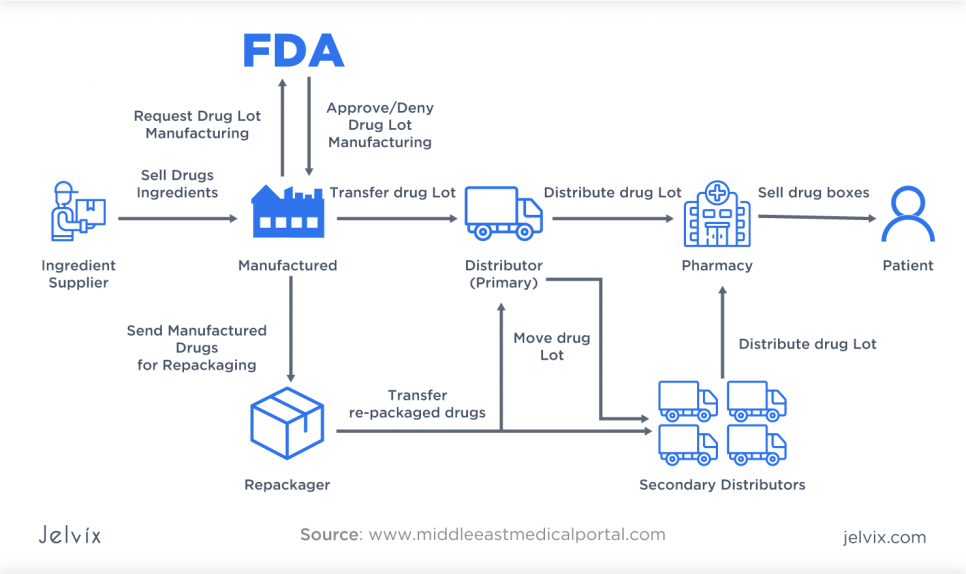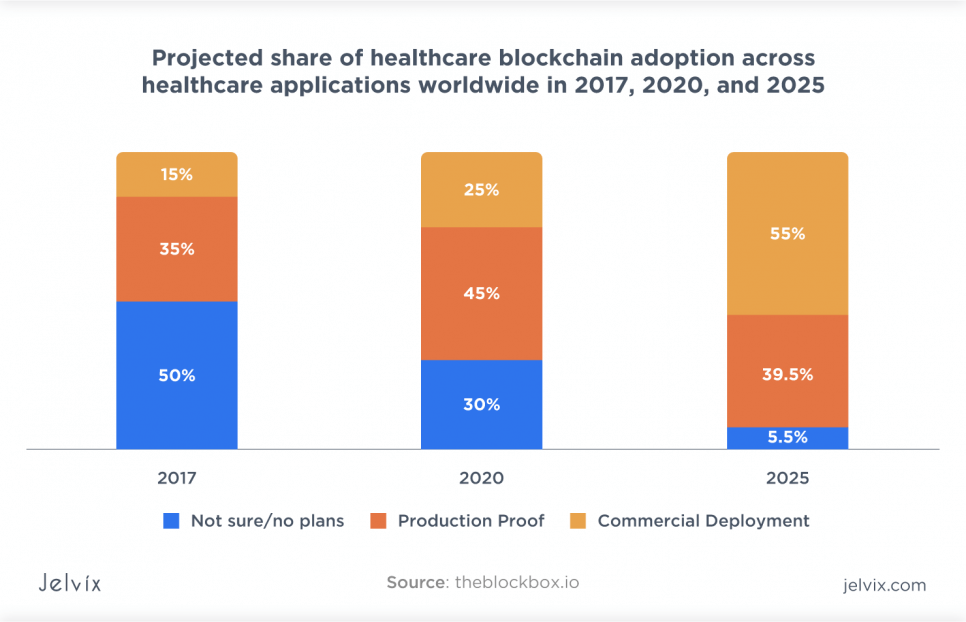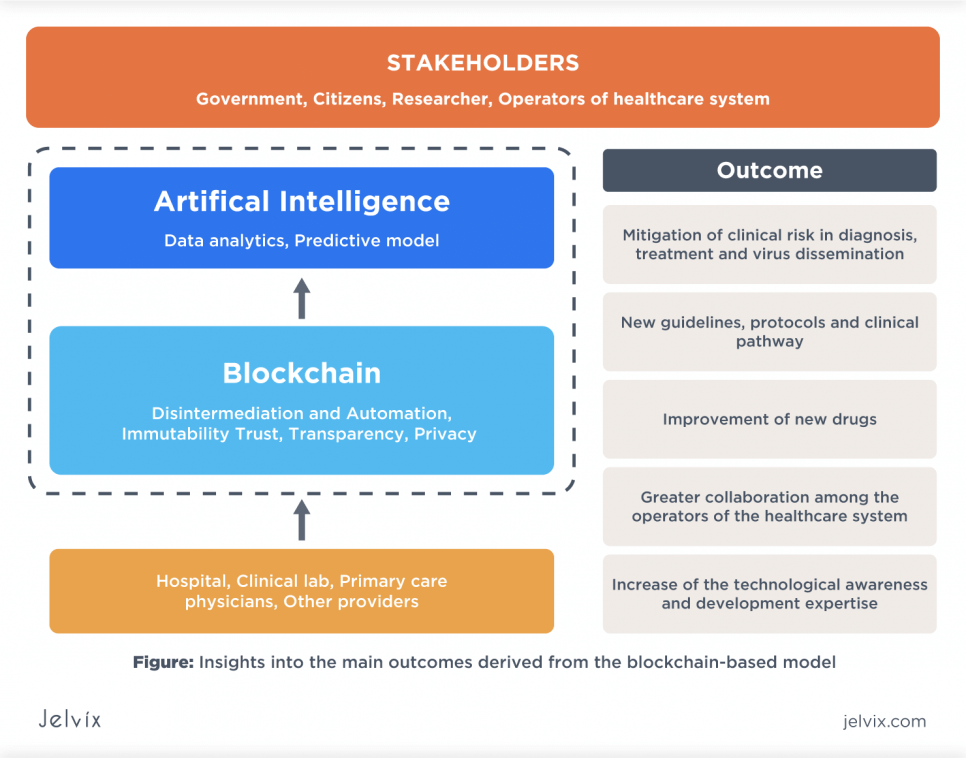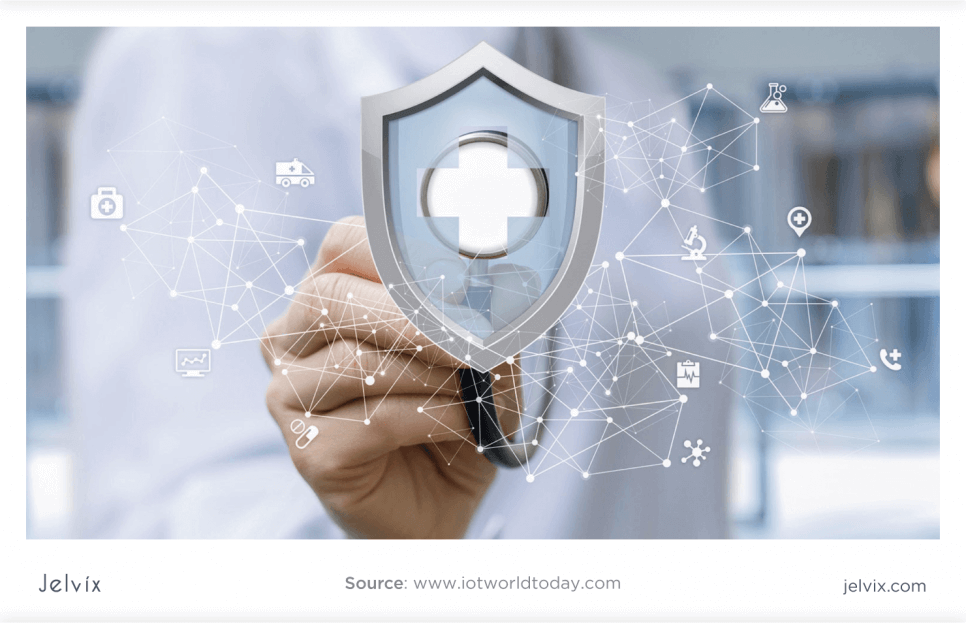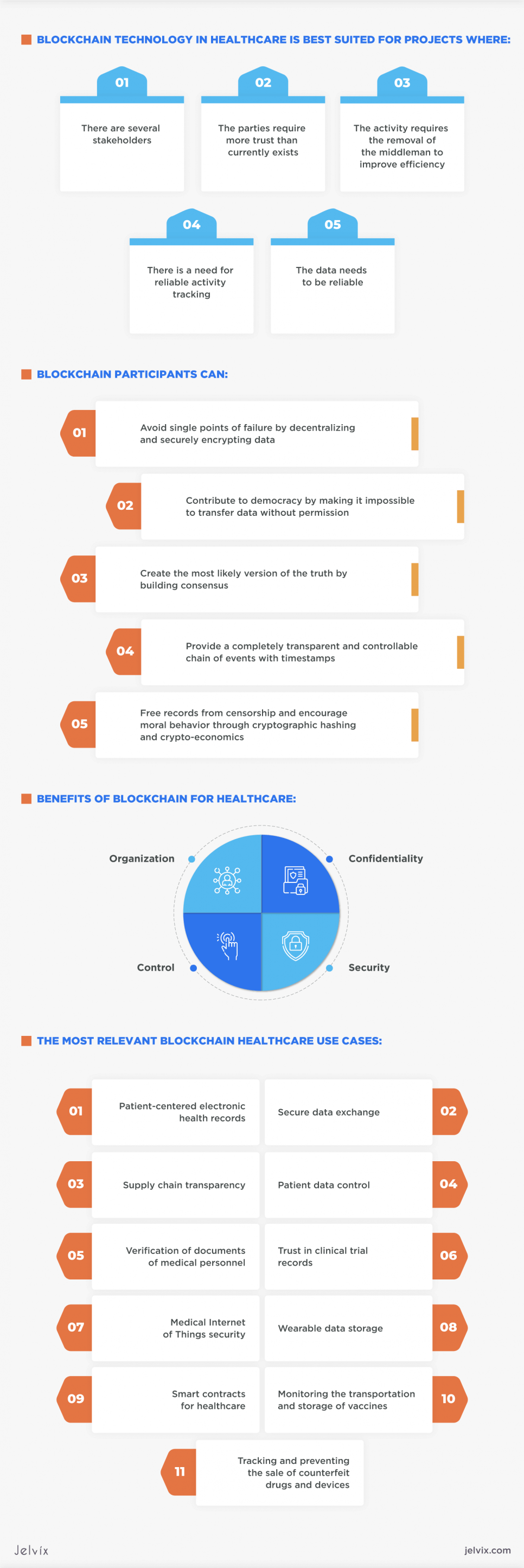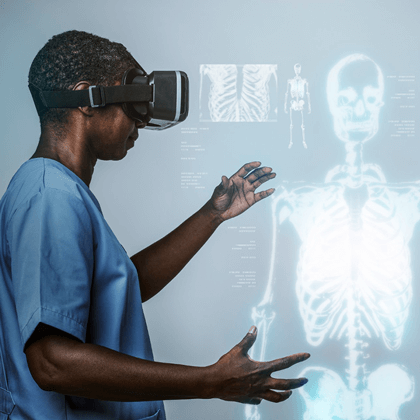The healthcare sector has been progressively driving technological innovations, but the COVID-19 pandemic has sped up this process drastically. Face-to-face visits to the doctors have turned into video calls, paper medical records into digital files, and conventional sensors into advanced monitoring systems.
However, despite technological advances, the vast majority of modern health information systems are still fragmented. The volume of medical data is growing, but the information remains isolated and inaccessible from the outside. This is ineffective in terms of research and the exchange of medical information and prevents health care suppliers from providing patients with prompt and effective care.
The increasing complexity of diseases, overworked doctors, and constant data breaches demands greater efficiency and innovation. Fortunately, implementing blockchain technology in healthcare can solve many of these problems.
Introduction to Blockchain
Blockchain is a system made up of linked blocks of data chained together by digital cryptographic signatures. Each one is called a “hash” and is stored in shared digital ledgers maintained by the nodes. These nodes are a network of related processes that are constantly updated and synchronized and retain a secure copy of the entire chain.
Blockchain is often referred to as “decentralized,” which means that data is stored simultaneously by several parties and belongs to participants in the chain. Everyone keeps records of the entire array of information by themselves. All forms are time and date-stamped. To change the data, all participants must agree to these changes.
Blockchain technology healthcare is best suited for projects where:
- There are several stakeholders.
- The parties require more trust than currently exists.
- The activity requires the removal of the middleman to improve efficiency.
- There is a need for reliable activity tracking.
- The data needs to be reliable.
As a result, the blockchain participants can:
- Avoid single points of failure by decentralizing and securely encrypting data.
- Contribute to democracy by making it impossible to transfer data without permission.
- Create the most likely version of the truth by building consensus.
- Provide a completely transparent and controllable chain of events with timestamps.
- Free records from censorship and encourage moral behavior through cryptographic hashing and crypto-economics.
Benefits of Blockchain for Healthcare
Blockchain technology is a few simple ideas with exciting properties at their core, but they respond to significant health issues. The dominant advantages of blockchain are:
Control: End-users – businesses and especially consumers – will have much more control over the use of their data. This means that patient history will not be shared between professionals without their permission.
Confidentiality: Blockchain technology provides patients with increased confidentiality, as their personal “key” code is required to access the records. In addition, administrative users will update only those records to which they have access – the rest of the documents in the chain remain safe.
Organization: Hospitals and clinics will be organized more clearly, and patients will have the added benefit of transparent document management, including prescriptions and billing.
Security: the very structure of the blockchain makes it sufficiently secure against internal and external attacks. When configured correctly, adding fake transactions is extremely difficult and costly, which has made this technology so attractive to many industries.
The Most Relevant Blockchain Healthcare Use Cases
Blockchain solutions, albeit slowly, are being introduced into healthcare systems to transform healthcare delivery, ensure a global patient focus, and improve health-related data security and privacy. However, the key to the success of blockchain technology in healthcare is the unmatched interoperability it can provide.
This blockchain promise can be realized by using complicated APIs to make data storage and EHR interoperable a robust process. Allowing the blockchain network to be shared by authorized vendors in a secure and standardized manner will eliminate the cost and burden of data reconciliation.
Patient-Centered Electronic Health Records
Healthcare, as a data-intensive industry, constantly faces the problem of disparate data. And according to the American College of Surgeons, blockchain technology could become a “convergence point for health information.” And while EHRs haven’t evolved much, blockchains don’t require healthcare providers to ditch their current systems and databases.
Building a blockchain-based system for medical records and integrating it with existing electronic medical records software can provide a comprehensive, unified view of any patient. In this scenario, every time a patient agrees to share part of their medical record or a patient’s medical history is amended, it is recorded on the blockchain as a transaction.
Patients will see when their blockchain medical records are updated and consent to any information being shared with healthcare professionals or others.
Secure Data Exchange
The blockchain’s capacity to keep an incorruptible, decentralized, and transparent log of all patient data makes it the desired technology for security applications. In addition, while the blockchain is transparent, it is private, hiding the identity of anyone with secure codes that can protect the privacy of medical data.
The decentralized character of technology will enable patients, doctors, and healthcare vendors to share the same information speedily and safely. In addition, complete, digitized, and shareable patient histories will facilitate more advanced analytics with powerful segmentation and analysis of targeted treatment outcomes.
Supply Chain Transparency
Imagine being able to view the entire healthcare supply chain and isolate an issue without having to analyze hundreds of unrelated documents. Having access to detailed records at every stage of the chain will make it easy to spot fraud or counterfeit drugs as you can view drug certifications, verify supply sources, and monitor delivery volumes.
In addition, blockchain solutions provide an audit trail that tracks drugs in the supply chain, streamlines enforcement, deter inappropriate behavior, and notifies parties of any inconsistencies.
Patient Data Control
The real revolution in healthcare will come when patients take responsibility for their health and make better decisions. This can only be achieved by providing patients with the knowledge or tools to control their health care.
First, patients can keep access to their piece of data in the blockchain and track or revoke access to their data. Patients will no longer have to trust the security of their information to institutions or any other third party that has to track thousands, if not millions, of these people. Blockchain will be a thing of the past when patients are harassed by third-party providers they have never heard of.
Verification of Documents of Medical Personnel
Similar to tracing the origin of medical products, blockchain technology can track the expertise of medical professionals. Trusted medical institutions and healthcare organizations will register their employees’ credentials in the system and simplify the hiring process for healthcare organizations. The blockchain system will provide:
- Faster certification of medical organizations when hiring.
- Informing patients about the experience of medical personnel and confidence for organizations hiring subcontractors.
- An opportunity for insurers and healthcare providers to monetize past and existing staff credentials.
Trust in Clinical Trial Records
Misrepresentation and manipulation of results are severe problems in clinical trials. In addition, access to data collected in clinical trials is often tricky despite the prescriptions. Failed trials are also often missing from datasets, so convincing performance may be hidden from the public and regulators.
A blockchain-based solution will efficiently capture the entire test history with authenticity built into the algorithm. With the ability to record and time-stamp real-time data, tampering with reports and switching results can be easily identified. In addition, the transparency of the data will prevent organizations from announcing manually selected results, which will increase the credibility of clinical trials.
Medical Internet of Things Security
One of the most significant innovations in digital health is the introduction of remote monitoring solutions. They use different sensors to measure and monitor the vital functions of patients. It helps healthcare practitioners monitor patients’ health, providing proactive and preventative care.
However, security is a huge health concern in the IoT, as there is a need to keep patient data confidential and secure and ensure that it is not tampered with to create false information.
Blockchain cryptography ensures that only allowed parties can access personal data. They are stored on the blockchain as a unique hash function. Any change to the original data will cause a different hash function to be created. The user must have a specific set of cryptographic keys to decode the hash function into the original data.
Therefore, if the patient’s data is recorded in the blockchain registry, you will need to access all saved copies to change them.
The decentralized nature of blockchain allows IoT devices to interact directly with each other, bypassing a centralized server (as most IoT connections do today). This makes it difficult to launch DDoS and middleman attacks.
Wearable Data Storage
The massive data generated by wearable and home medical devices are usually stored in the cloud for personal use and is not available to doctors. In addition, wearable devices and home medical devices have security vulnerabilities that pose a severe threat to sensitive patient health data.
But using blockchain can link every wearable device to a patient data center with all of the patient’s medical records to provide clinicians with a single, distributed, real-time view of information. Not to mention, the data received from the wearable devices will be secure and immutable since records on a distributed network cannot be changed without an audit trail.
Smart Contracts for Healthcare
Additional rules, often called smart contracts, can be built into decentralized, immutable, private, and trusted blockchain ledgers to govern data usage. Initially, innovative contract technology was only used to record transactions, but now it can also be used to launch programs or functions.
Smart contracts are not a core feature of every blockchain, but they often play a central role in their use in the complex world of healthcare. Once established, a smart contract embedded in the blockchain is immutable and can be trusted with reliable information shared by all parties equally for an indefinite period.
This allows the parties to interact directly with each other without the need for intermediaries.
Monitoring the Transportation and Storage of Vaccines
Combined with the Internet of Things technology (such as temperature sensors), blockchain can monitor critical information about the transporting and storage of vaccine batches. For COVID-19 vaccines, for example, it is essential to control the temperature and the storage duration. This means that accurate monitoring of different vaccine batches is necessary.
This monitoring will be carried out using IoT sensors on transport containers, collecting, transmitting, and storing information on the blockchain. All parties to the vaccine delivery chain, including distributors, hospitals, and regulators, will view this on the blockchain and verify that vaccines have been transported and stored correctly.
Tracking and Preventing the Sale of Counterfeit Drugs and Devices
Many drugs and medical devices sold in developing countries are imitations of the original ones. A blockchain-based system can make the healthcare supply chain more transparent and provide all parties with a sound tracking system that monitors the delivery of a legitimate product from the manufacturer to the patient.
Such oversight can prove fatal to the proliferation of counterfeits. In 2020, Merck KPMG, IBM, and Walmart took part in a pilot program to study the effectiveness of blockchain to track prescription drugs. Through simulation, the participants felt they could check the status of a product in just a few seconds.
Currently, many of the above blockchain innovations are still in alpha or beta testing. As a result, experts warn that these types of products should not hit the market too early.
How is Blockchain Changing the Healthcare Industry?
The global healthcare blockchain technology market is projected to reach USD 126 billion in revenue by 2030 and will continue to grow at a CAGR of 68.1%.
Blockchain-based healthcare systems, including software, applications, and connected medical devices, open great promise for healthcare ecosystems around the world.
First, developing blockchain-based solutions can eliminate the friction and high costs of existing medical systems, software, and intermediaries. Thus, blockchain-based health information sharing allows all fragmented systems to seamlessly connect and generate collaborative insights that lead to better healthcare delivery and evaluation.
As a result, the collaboration between hospitals, institutions, practices, pharmaceutical companies, and patients will be faster. It will no longer be held back by system fragmentation, incompatibilities, or lack of trust.
Thus, in the long term, a nationwide (or even worldwide) blockchain-based health information exchange network can foster efficiency, collaboration, interoperability and ultimately improve health outcomes.
The incorruptible and decentralized structure of the blockchain makes it a reliable platform for the protection, storage, and secure exchange of sensitive patient data. These features are also crucial to developers, as they must provide secure interfaces for transferring medical data between stakeholders while respecting GDPR and HIPAA compliance.
The role of healthcare cryptocurrency in the health sector is also worth mentioning. In global funding flows, significant amounts of money are lost because of administrative and transaction costs. Cryptocurrencies will allow you to bypass unnecessary costs, saving funds for the original purpose. In addition, you will be able to remove any intermediaries from the transaction and, therefore, reduce the possibility of fraud.
Using medical cryptocurrencies supported by the blockchain-based decentralized information exchange system could also become a standard. For example, a stem cell coin was created to popularize a way to pay for the cost of stem cell therapy at partner hospitals.
How is Blockchain Used in Insurance?
How blockchain technology solves healthcare problems is explained with the example above. But there are other areas in which it can be helpful, such as insurance, as it helps the blockchain ensure the information’s accuracy, reliability, and security.
Initial areas considered for insurance include the use of blockchain to automate claims payment and claims handling functions, checking coverage between suppliers and reinsurers. Using blockchain, it is possible to automate payments between parties for claims and thus reduce administrative costs for insurance healthcare blockchain companies.
Another use of blockchain is the transmission of any type of digital evidence for underwriting, including the use of electronic health records. The combination of the Internet of Things and AI will lead to the automation of insurance processes that will change our industry soon.
Blockchain and AI Technologies Convergence
Blockchain and AI are two of the most promising technologies of our time, judging by blockchain healthcare reviews. So, what is the potential for the use of AI and blockchain in healthcare?
AI is being used for medical diagnostics, accurate data analysis, interpretation, drug discovery, and faster time-to-market. While AI uses data, blockchain ensures the security of that data and helps define the logic of the algorithmic decision-making process.
Data from clinical laboratories, hospitals, primary care physicians, pediatricians, and other sources is transmitted confidentially and securely using blockchain. Data analysis is carried out using AI solutions. This model facilitates research on treatments and the development of new drugs.
Blockchain plays a strategic role in COVID-19 safe clinical practice. The combination of blockchain and AI enables rapid diagnosis and treatment of COVID-19 patients and contributes to the development of clinical guidelines for epidemics (such as coronavirus).
Risks of Using Blockchain in the Health Sphere
While blockchain technology seems to be excellent, we must not forget that it is just a tool. And the more complex the blockchain system is, the more opportunities there are to make mistakes while setting it up. Under certain conditions, the system can be quite vulnerable because of poor quality execution or unintentional software errors.
The information that is put into the blockchain is not necessarily accurate or of high quality.
In addition, if blockchain is used to process significant volumes of data, it will incur additional operational costs because of performance overhead and expose the network to DDoS attacks. And complying with the GDPR requirements may require manipulating the immutability of the blockchain, which is contrary to the very concept of blockchain.
Careful planning and precise execution at both the technical and administrative levels are required to avoid jeopardizing everything related to the new technology. It is a stimulus for research to improve security for the blockchain and healthcare.
The need to transfer information management to the patient is not questioned, but before that, all patients and users must be trained to know what to do. Another problem is that the ability to access data in a blockchain is done using a “key,” which is a unique sequence of characters and numbers.
After the key is lost, the data it accesses becomes irrecoverable. Losing access to health information is unacceptable, and solutions will need to be implemented to reconnect users to their data.
Another problem might arise if one company gains access to the majority of servers (more than two-thirds with current corporate methods). In this case, one agent can become the only consensus agent and will be able to change the blockchain, which is contrary to the property of immutability. Protection may require new consensus technology and government regulation of blockchain monopolization.
Conclusion
Given the potential of blockchain in healthcare for patients of healthcare providers and insurers, we see established market leaders both rethinking and scaling up existing business models and looking for new market opportunities.
But the industry isn’t just for tech giants. With the many benefits that new technologies offer, this is the right time for entrepreneurs and blockchain healthcare startups looking to leap forward.
Those organizations that recognize the benefits of the blockchain system and integrate it into their healthcare business will be well-positioned to dominate new technology platforms.
As a leading software company, Jelvix helps companies and startups digitize financial assets, streamline business processes, launch decentralized networks, and deploy turnkey blockchain solutions. If you are thinking about blockchain-based software, contact the Jelvix experts today!
Need a qualified team?
Use our top talent pool to get your business to the next level.



